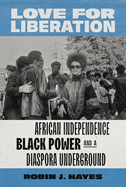
Historians and those interested in current affairs are sure to be intrigued by Love for Liberation: African Independence, Black Power, and a Diaspora Underground, in which Robin J. Hayes traces the roots of modern social-justice causes to the mid-century Black Power movement, via the connection of a Diaspora Underground. Hayes, a contributor to the Atlantic and writer and director of the award-winning documentary Black and Cuba, explains that diasporas always begin with discomfort in a homeland--even if that homeland is another region within a nation. This discomfort--whether a legacy of American slavery and the Jim Crow South or caused by brutal colonial practices in Africa--has led to a strong sense of Black community among Africans and Black Americans alike.
A diasporan mentality is also cultivated by mores that oppose mainstream ideas--such as "affirming that 'Black is Beautiful!' Or 'Black Lives Matter' [which] is radical in its challenge to racist regimes that consistently represent Blackness as ugly and inhumane." Inspired by mid-century freedom movements in Ghana, Algeria, Congo and other African nations, diasporans became motivated to improve Black political representation and Black livelihoods in the United States.
Thoughtfully researched and well-documented, Love for Liberation is a fascinating academic treatise on the ways Black Americans have created a cohesive culture, and strengthened connections with African communities. And, as Hayes clearly demonstrates, "although African independence and Black Power weren't able to fully actualize their goal of complete self-determination, today's generation of social justice activists appear to be taking cues from their limitations and the best of their examples," creating hope for the future. --Jessica Howard, bookseller at Bookmans, Flagstaff

